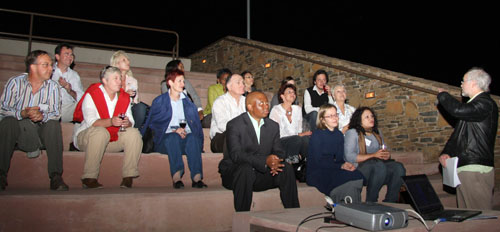Latest News Archive
Please select Category, Year, and then Month to display items
14 June 2024
|
Story Anthony Mthembu
|
Photo Suplied
 Jeremiah Hlahla, a UFS student completing his PhD in Botany at the University of Debrecen as part of an exchange initiative funded by the Erasmus+ Mobility Programme.
Jeremiah Hlahla, a UFS student completing his PhD in Botany at the University of Debrecen as part of an exchange initiative funded by the Erasmus+ Mobility Programme.
As part of an exchange initiative facilitated by the Erasmus+ Mobility Programme, Jeremiah Hlahla, a student at the University of the Free State (UFS), is nearing the completion of his PhD studies at the University of Debrecen in Hungary. Hlahla’s journey, which began in February 2024 and is set to conclude in July 2024, has been a remarkable learning opportunity. “As a first time-traveller to Europe, I have thoroughly enjoyed engaging with people from different countries and cultures,” he said.
The benefits of international collaboration
Hlahla is currently pursuing a PhD in Botany, focusing on plant stress physiology. “My current PhD project investigates the physiological, biochemical and morphological responses of vegetable-type soybean, or edamame, to combined drought and heat stress,’’ he explained. He considers the University of Debrecen the ideal institution to complete his research due to its extensive expertise and resources in similar projects. He noted that his colleagues at Debrecen conduct significant work on plant protection against biotic and abiotic stresses, including salt and drought stress, as well as proteins and amino acids in barley and other legumes.
Given the vast knowledge available on similar projects, Hlahla has found substantial engagement with his work at the University of Debrecen. “Upon arrival, I delivered an introductory lecture presenting my UFS project on the synergistic effects of combined drought and heat stress on the physiology and biochemistry of edamame. It was an engaging session as everyone could relate to my work and asked many questions,’’ he said.
Insights gained from the exchange
Hlahla has also gained valuable lessons that will assist him in his research career, including biotechnology and physiology tools. “I learned how to prepare samples and use high-performance liquid chromatography (HPLC) and reversed-phase ultra-high-performance liquid chromatography (UHPLC) to quantify proteins and amino acids,’’ he said. These techniques are beneficial not only for his current work but will also support future soybean research.
As his experience at the University of Debrecen nears its end, Hlahla reflects on the collaborations and friendships he has formed, which stand out as a significant highlight.
Gauteng business community experiences UFS
2010-09-23
 |
|
Prof. Matie Hoffman from the Department of Physics of the UFS, presenting at the Boyden Observatory to a group of business executives from Gauteng, during their recent visit to the university.
Photo: Gerhard Louw
|
The University of the Free State’s (UFS) Corporate Liaison Office recently hosted a group of eleven business men and women from the private sector in Gauteng on its Main Campus in Bloemfontein. The purpose of the campus visits, which are held two to three times a year, is to give representatives from the corporate sector the opportunity to get to know the UFS first-hand and to help build the brand of the university as a national asset.
During their visit the group of business men and women, amongst others, met with faculty members, they enjoyed a networking session with UFS staff at the Oliewenhuis Art Museum, visited the Unit for Students with Disabilities as well as the Department of Paediatrics and Child Health.
The day ended at the Boyden Observatory where a feedback session was facilitated by Prof. Jonathan Jansen, Rector and Vice-Chancellor, and Prof. Ezekiel Moraka, Vice-Rector: External Relations. After this opportunity where the visitors discussed their experience of the UFS, the day came to an end with a presentation on: The African skies: Stories and science by a Ph.D. candidate from the Department of Physics, Mr Bosco Oruru. One of the highlights of the evening included a sighting of the Hubble Telescope in the sky over Bloemfontein and observing the moon and Venus through one of the Boyden telescopes.
The visitors left with new insights and a great appreciation for the contribution of the UFS to education, research and community service in South Africa.